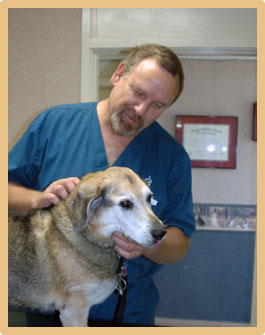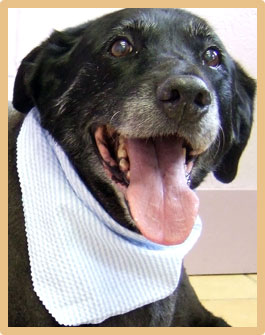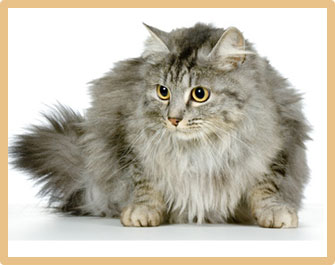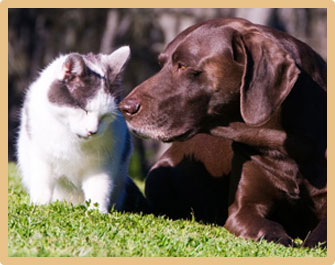Senior Pet Care
 Older pets have special health care needs and may require more attention and care than younger pets. As your pet ages, changes occur in his physical condition that warrants more frequent visits to the veterinarian.
Older pets have special health care needs and may require more attention and care than younger pets. As your pet ages, changes occur in his physical condition that warrants more frequent visits to the veterinarian.
Early Detection – easier on pet and less costly If medical problems are recognized and treated when they are first detected, the treatment may be easier for your pet and less costly for you.
Twice-a-Year Wellness Examinations – Two appointments per year are recommended for older dogs and cats to potentially diagnose medical problems in the early stages.
A geriatric exam is more extensive than a simple check-up and includes:
- A complete physical exam
- Oral and rectal examinations
- Recording of body weight and body condition
- Examination of ears, eyes, and various internal organs
- Some laboratory work may be done including a complete blood count, urinalysis, fecal exam, and perhaps endocrine blood tests
- Other complimentary examinations
Establishing a base line is an added benefit and can ultimately help your pet should there be any changes, even small ones, to your pet’s health.
Aging process varies between dogs, cats and even specific breeds and individual animals:
- As a general rule, owners should start to consider their cat a senior around 8-10 years and 6-8 years for dogs.
- As dogs and cats grow older, their organs may become less efficient and they may be less able to resist infections and other diseases.
- As a responsible pet owner, you want your pet to remain healthy and active for as long as possible so it is important to be aware of any condition that may warrant your veterinarian’s attention.
Signs of Aging in Dogs

- Your dog’s coat and the area around his muzzle begin to turn gray. Because your pet is getting older, it is important to know that skin problems may occur more often since the skin may be thinner, less elastic, and does not repair itself as quickly.
- Your senior dog begins to slow down, has less energy and has trouble getting up or limping.
- Longer and more frequent naps are common side effects of aging.
- A change in habits, including play preferences and eating or drinking habits is commonly observed in older dogs.
- Weight changes are common in older dogs. Some dogs gain weight as they age while others lose weight.
- Dental problems that translate as bad breath are more likely to appear in older pets.
- Hearing, vision and other senses become less acute when dogs get older.
Signs of Aging in Cats

- As old cats are often less active, their muscle tone tends to reduce which may further reduce their ability to run, jump and climb. Lack of exercise contributes to the stiffening of joints.
- Frequently older cats suffer from a poor appetite as the senses of taste and smell often deteriorate with age. Teeth problems are common and can discourage eating.
- Bowel function may deteriorate with age, causing problems such as reduced ability to absorb food nutrients. This can lead to weight loss. Some elderly cats suffer from constipation.
- Elderly cats have decreased thirst and they are at risk of becoming dehydrated. This is particularly dangerous in cats with kidney problems.
- Older cats tend to sleep less heavily but more frequently.
- Elderly cats often have poor coats that may make them less resistant to the cold and wet.
General Tips for Your Aging Pet

Diet – There are several reasons why a special diet may be needed for an elderly pet. He or she may be less active than a younger animal, and therefore may require fewer calories. The digestive organs may become less efficient in digestion and absorption, and a highly digestible diet may be more appropriate. Phosphorus and protein content may need to be decreased if your pet has kidney problems. Under certain circumstances the vitamin and mineral needs of elderly pets may be different from those of younger animals. Some of the special senior diets have mineral and vitamin content carefully adjusted to help provide the appropriate balance for elderly pets that have failing kidney or heart function.
Joints – As your pet gets older, joint pain and stiffness may develop. This may mean that your pet becomes less active and his energy level may decrease. He may become tired more easily and want to nap more often. Dogs with arthritis should still be exercised; however, they may need a diet containing fewer calories to prevent them from putting on weight.
Hearing, sight and smell – can all become less acute with age and you may need to make allowances for these changes. Watch for signs of impaired sight such as bumping into furniture or loss of hearing if your pet stops reacting to its name or command. Eye infections, cataracts, decreased night vision, or even blindness is common, however, these can also be symptoms of a larger problem. Your veterinarian can help you distinguish between the normal aging process and an acute problem.
Dental – Older pets are more likely to develop tooth and gum conditions. If your pet has sore gums or loose teeth, he or she may be reluctant to eat. Gum disease not only leads to loss of teeth, but can also cause heart and kidney infections if bacteria enter the bloodstream through the inflamed gums. Examine your pet’s mouth regularly and ask your veterinarian for advice if the teeth or gums do not look healthy.
Urinary – Often associated with hormonal imbalance in spayed females or a disorder of the nervous system that controls bladder function, urinary incontinence or inappropriate urination is common in an aging pet. Inappropriate urination may also be the result of a urinary tract disorder, prostate problem or symptomatic of a larger problem. Consult your veterinarian if your pet suddenly becomes incontinent or begins to urinate more frequently.
Behavior – As your pet ages, his behavior may change significantly. You might interpret this as simple aging, but it actually might be due to a treatable geriatric disease, such as cognitive dysfunction. Some typical signs include confusion, disorientation, decreased activity, changes in the sleep/wake cycle, loss of house training, or signs which suggest a decrease in your dog’s interest in, or ability to interact with his environment or with you.
Kidneys – Excessive thirst and frequent or uncontrolled urination are often signs of kidney problems or diabetes. Since the kidneys process and eliminate body waste products into the urine, it is important that these organs remain healthy. If your pet’s kidneys are not functioning properly, your veterinarian may recommend a diet specially designed for kidney problems.
Even if your pet seems perfectly healthy, regular geriatric check-ups are important to manage many of the changes associated with aging. Dogs and cats over seven years of age should be examined by a veterinarian twice a year. Pets can be the most rewarding when they reach middle or old age; they know you, have a special routine, and have spent years as your companion. Maintaining the health of your aging pet is a part of your mutually beneficial relationship and can provide both of you with many more years of love and companionship.
We will provide the services to assist your pets in living longer, more productive lives and we will do our best to keep them happy and healthy for a long time. Feel free to give us a call at (740) 772-2226 to make an appointment.